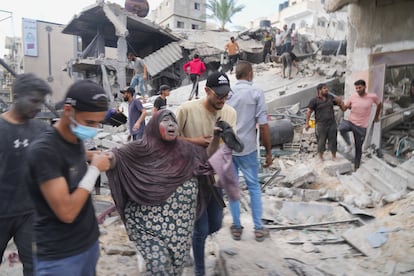Israel intensifies bombing of Gaza and hits the West Bank and southern Lebanon
The air attacks on the enclave have increased while the Israeli army continues to demand the population evacuate to the south


Israel has been intensifying its air strikes in the northern Gaza Strip since the end of the Jewish Sabbath, following the deployment of troops, artillery and tanks that are now just awaiting the order to advance into the enclave. The Israeli army appears to be scrupulously carrying out its three-phase plan to invade Gaza and destroy Hamas and its militias. On Sunday, General Daniel Hagari, the spokesperson of the Israeli Defense Forces (IDF), once again urged the Palestinian population to move to the south of the Gaza Strip. Since the ultimatum was issued 13 days ago, more than 700,000 inhabitants of northern Gaza have fled south. The Israeli army also bombed a mosque in Jenin (West Bank) and continues to engage in exchanges of fire with the Hezbollah militia in southern Lebanon.
After midday on Sunday, the Gazan Health Ministry raised the number of Palestinians killed in the bombardment of the last 24 hours to 266, according to Reuters. Israel again urged the civilian population to leave the northern part of the Strip, particularly the enclave’s capital, where it believes the command centers of the Izz ad-Din al-Qassam Brigades and Hamas political leaders are hiding in a secret network of tunnels.
“Urgent notice to Gaza residents. Your presence north of the Gaza River [limit set by the army in the central area of the enclave] puts your lives in danger. Anyone who decides not to leave northern Gaza to the south of the river could be identified as an accomplice of a terrorist organization,” it is stated in Arabic in pamphlets dropped from the air over Gaza City and in text messages sent to residents’ cell phones. Of the 1.1 million Palestinians who reside in this part of the coastal territory (almost half of the total), some 700,000 have already fled to the south.
In addition, at least four Palestinians were killed in Israeli army attacks on the West Bank overnight, according to the Palestinian National Authority (PNA). One of the attacks hit a mosque in Jenin that, according to Israeli forces, served as an “underground terrorist infrastructure.” The PNA issued a statement denouncing the bombing on Saturday night, arguing it represents a “dangerous escalation” of the conflict. Meanwhile, tension also remains in the north of the country, on the border with Lebanon, where the army has decided to evacuate another 14 towns in the face of the attacks and clashes with the Shiite militia party Hezbollah. Israel warned that Hezbollah is “playing a very dangerous game.” For its part, Syria has accused Israel of attacking the airports in Damascus and Aleppo, causing flights to be grounded.
In the midst of the Israeli attacks, the humanitarian aid has once again been allowed to enter Gaza from the border post with Egypt in Rafah, where the agreement reached by the United States with Israel and Cairo permitted the first convoy of aid on Saturday. Some 20 trucks carrying food and medicine were allowed to enter the enclave, but this is not enough to meet the needs of the population. According to the Reuters news agency, the second convoy is made up of 17 trucks.
IDF spokesman Hagari said 212 hostages remain in the hands of Hamas in Gaza, after the October 7 attack on Israeli territory that caused the death of at least 1,400 people. Since the start of the war, more than 4,600 people in Gaza have been killed in Israeli attacks and bombings. According to the Palestinian Ministry of Health in Gaza, 70% of the victims are civilians.
Sign up for our weekly newsletter to get more English-language news coverage from EL PAÍS USA Edition
Tu suscripción se está usando en otro dispositivo
¿Quieres añadir otro usuario a tu suscripción?
Si continúas leyendo en este dispositivo, no se podrá leer en el otro.
FlechaTu suscripción se está usando en otro dispositivo y solo puedes acceder a EL PAÍS desde un dispositivo a la vez.
Si quieres compartir tu cuenta, cambia tu suscripción a la modalidad Premium, así podrás añadir otro usuario. Cada uno accederá con su propia cuenta de email, lo que os permitirá personalizar vuestra experiencia en EL PAÍS.
¿Tienes una suscripción de empresa? Accede aquí para contratar más cuentas.
En el caso de no saber quién está usando tu cuenta, te recomendamos cambiar tu contraseña aquí.
Si decides continuar compartiendo tu cuenta, este mensaje se mostrará en tu dispositivo y en el de la otra persona que está usando tu cuenta de forma indefinida, afectando a tu experiencia de lectura. Puedes consultar aquí los términos y condiciones de la suscripción digital.








































